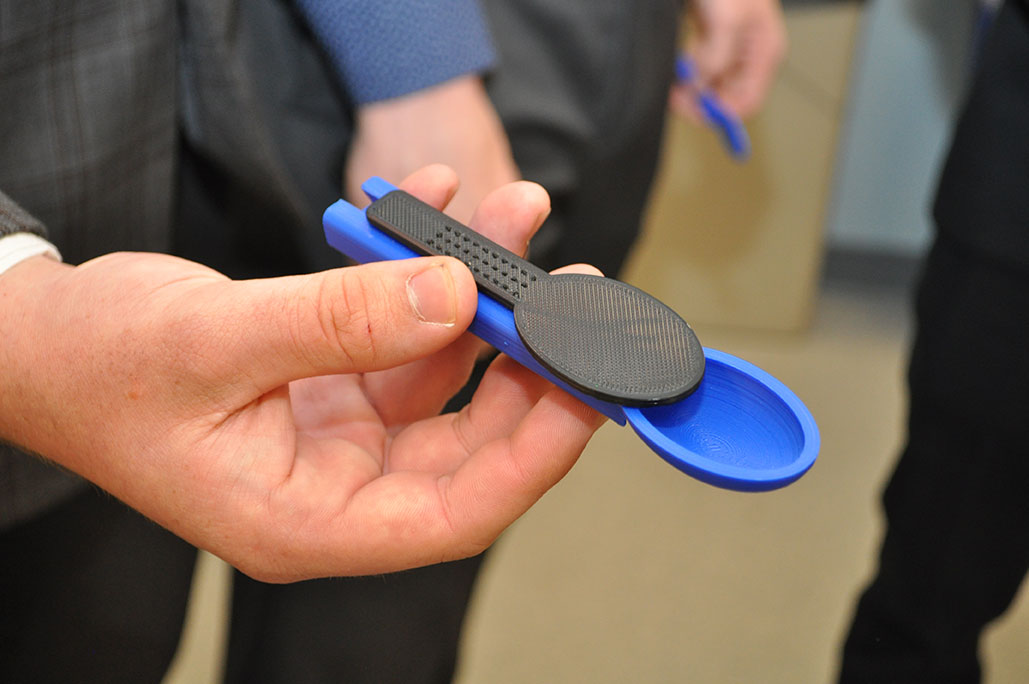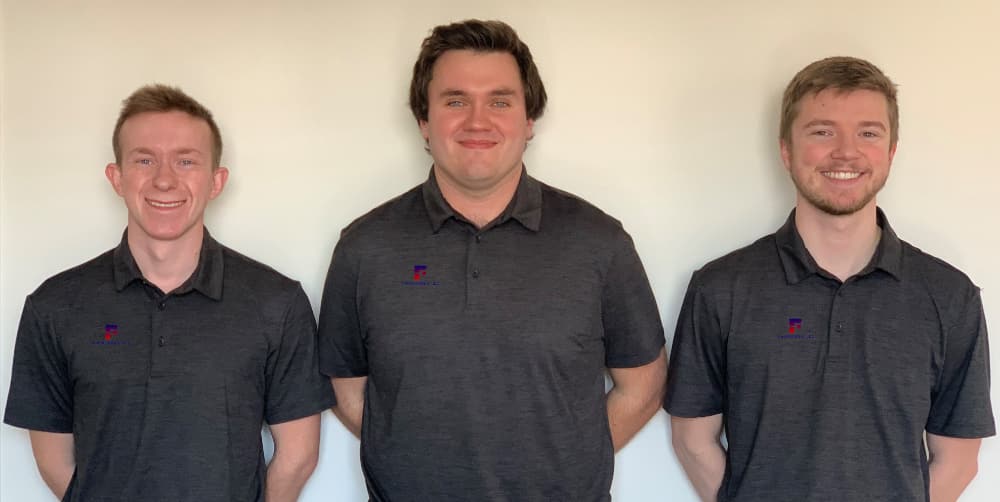
Eating. Many of us can do it completely absentmindedly. We eat while walking, driving and even talking. However, for millions of people worldwide with Parkinson’s disease, tremors and other movement disorders, trying to use a utensil to eat is a frustrating, messy and often embarrassing exercise in futility. But thanks to a team of Purdue Polytechnic students who enrolled in the Design & Innovation Minor, a better eating utensil is emerging from the classroom.
The Design & Innovation Minor plan of study provides the time and resources over multiple semesters for students to apply design-thinking methodologies that solve real-world problems. For students Zackary Roth (mechatronics and robotics engineering technology), Brock Langley (mechanical engineering technology) and Jack Williams (mechanical engineering technology) – collectively known as “The Techie Team” – the problem they were addressing wasn’t merely real-world but also personal. Roth and Langley have family members with Parkinson’s, and they become the inspiration for the team’s topic of problem.
Roth, Langley and Williams researched the marketplace and found only three solutions for Parkinson’s-friendly eating utensils: weighted spoons that counteract the involuntary hand motions. Next, the students brainstormed their idea for a plastic spoon with a closable cover that retains food even if one’s hand is shaking. They dubbed their product “The Seal Spoon” and have pursued more than 20 different designs by 3D-printing various iterations and testing each prototype with real users to be certain the spoon is intuitive.
“We had Zackary’s family try version 20 of the product and their comments were consistent with other users who had no family bias, which was surprising,” said Williams. “They were able to understand and grasp the mechanics without guidance. Moreover, the spoon was capable of holding liquid no matter the frequency of tremors and showed value to them.

“There was some criticism on the spoon’s texture, which is understandable, due to the resolution of the printers at our disposal and the rough finishes on the fine edges of the spoon. It just needs to be a more polished product before they are willing to take part in the learning curve of transitioning to eating with our adaptive spoon. Current versions are higher fidelity from the earlier generations and we are exploring different materials and printing methods for higher-end prototypes before settling on a design to injection mold.”
The Seal Spoon is on track to becoming an actual product that anyone with hand-coordination issues might be able to purchase, thanks to $25,000 in grant funding from the VentureWell organization, a funding network that supports student inventors. The funding will help the team conduct customer research, advance prototype development and establish their intellectual property portfolio as they move the Seal Spoon into the marketplace. VentureWell also provides students with access to an entrepreneurial coaching program. The Techie Team was one of only 17 groups selected through the competitive national review process, which were chosen based on the potential for their innovation or invention to have a significant positive social, health or environmental impact.
“This is exactly the outcome that we have been aiming for with the Design & Innovation Minor,” said Greg Strimel, assistant professor of technology leadership and innovation and principal investigator for the award. “The students have worked hard to move their idea beyond the boundaries of a course project toward a real innovation that can, one day, have an impact on people. Now, they can leverage their time at Purdue toward this goal.”
Besides Strimel, the students’ mentors include Nathan Mentzer, associate professor of technology leadership and innovation, and Shawn Farrington, continuing lecturer and TECH 12000 course coordinator.
If you or someone you know has a movement disorder and would like to test the latest iteration of the Seal Spoon, email sealyspoon@gmail.com.
